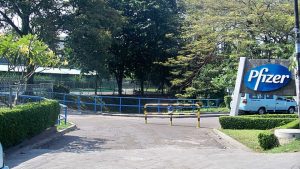In a significant stride towards safeguarding infants from respiratory syncytial virus (RSV), the CDC has recommended Pfizer's maternal RSV vaccine for expectant mothers in the 32- to 36-week gestational window. This advisory aims to protect children from RSV, a leading cause of infant hospitalizations in the United States. Director Mandy Cohen swiftly signed the approval, underscoring the urgency and significance of this new preventive measure, which received an 11-1 vote from an independent panel of CDC experts.
Director Cohen stated, "This is another new tool we can use this fall and winter to protect lives." She encouraged parents to engage with their healthcare providers about options for safeguarding their children against severe RSV illness.
RSV, along with other respiratory viruses, including COVID-19, continues to pose a threat in the United States. Public health experts are optimistic that Pfizer's vaccine, along with other interventions, will fortify the nation against RSV, particularly after a notably harsh season last year.
While RSV often manifests as mild, cold-like symptoms, it can lead to severe complications in young children and the elderly. The CDC reports that the virus claims the lives of hundreds of children under 5 and several thousand elderly individuals annually. Additionally, RSV causes between 58,000 and 80,000 hospitalizations in children under 5 each year.
If Pfizer's maternal vaccine is rolled out in the U.S. this fall and winter, it could potentially avert 16,000 RSV-related hospitalizations and 300,000 doctor visits.
Dr. Luis Jodar, Pfizer's Chief Medical Officer for Vaccine Medical Development, emphasized the historical significance of the company's single-dose RSV vaccine, which utilizes maternal immunization to transfer antibodies to fetuses, providing protection from birth until six months of age.
The FDA sets the recommended dosage period for expectant mothers at 32 to 36 weeks during pregnancy. Additionally, an RSV antibody injection for infants by Sanofi and AstraZeneca received approval during the summer, offering an alternative preventative measure for babies.
CDC medical officer Dr. Jefferson Jones emphasized that most infants may not require both Beyfortus and Pfizer's Abrysvo. The decision on which RSV prevention product to use should be made collaboratively between the pregnant individual and their prenatal care provider.
Further, the CDC's recommendation of Pfizer's maternal vaccine is based on a comprehensive phase three trial involving over 7,400 participants. The results demonstrated substantial efficacy, with the shot preventing severe RSV disease and breathing issues in newborns by 82% and 57%, respectively, in the first 90 days after birth. By six months post-delivery, the vaccine remained 70% successful at preventing severe disease and 51% effective at avoiding doctor visits.
While the vaccine received commendation from FDA experts, safety concerns were raised regarding a slightly higher rate of preterm births among mothers who received the shot.
In light of these findings, Pfizer will conduct post-marketing research to assess any potential risks related to premature birth. Additionally, the company will establish a pregnancy registry to monitor and document vaccine-related adverse events.
The CDC's endorsement of Pfizer's maternal RSV vaccine signals a crucial step towards protecting infants from this pervasive virus, offering hope for a safer and healthier fall and winter season for families across the United States.























